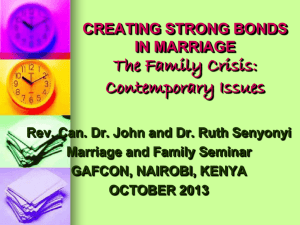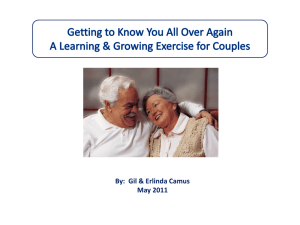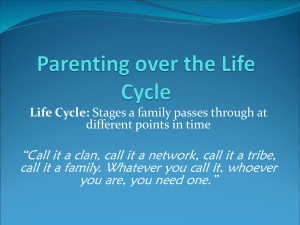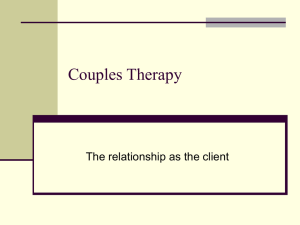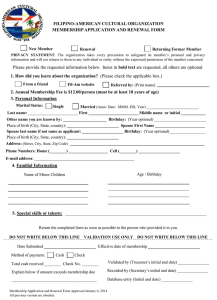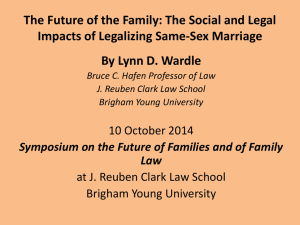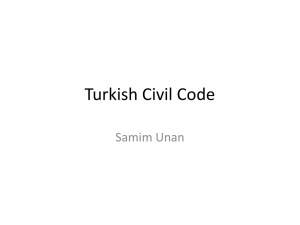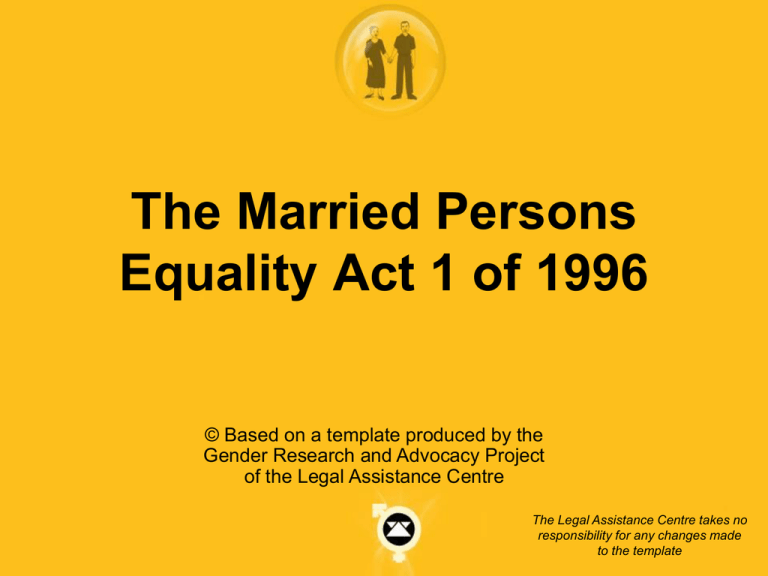
The Married Persons
Equality Act 1 of 1996
© Based on a template produced by the
Gender Research and Advocacy Project
of the Legal Assistance Centre
The Legal Assistance Centre takes no
responsibility for any changes made
to the template
The Constitution of Namibia
Article 10
1.
All persons shall be equal before the law.
2.
No persons may be discriminated against on the
grounds of sex, race, colour, ethnic origin, religion,
creed or social or economic status.
Article 14
1.
Men and women……shall be entitled to equal rights as
to marriage, during marriage and at its dissolution.
The Married Person’s Equality Act
• The MPEA removes sexual
discrimination from civil
marriages
• Married equality means that
in the eyes of the law a man
does not have the power to
rule his wife just because he
is a man
Marital power
• Before the MPEA the husband legally controlled
everything
– this included property, debts, loans etc
• The MPEA got rid of marital power - husbands
and wives now have equal decision-making
powers
Types of marriages in Namibia
Civil Marriage
Customary Marriage
• Wedding occurs before
registered marriage
officer
• Marriage certificate
issued
• Wedding registered with
government
• Follows customs &
traditions of community
• Currently not registered
• No marriage certificate
Civil or customary
How are you married?
• Most of the rules in the MPEA only apply to civil
marriages
• Most civil marriages in Namibia are in community
• Out of community marriages requires an antenuptial
contract
• This means that the default is in community
• To change the default, the couple must make an
ante-nuptial contract with a lawyer’s help
BEFORE the wedding
Marriage north of the old
“Police Zone”
•
•
The Native Administration Proclamation 15 of 1928 says
that marriages between blacks in Owamboland, Kavango &
Caprivi from 1 August 1950 are automatically
OUT of community
To change this default,
the couple must go to a
magistrate and fill in a form
saying that they want
a different system
BEFORE the wedding
Property and marriage
In community of property
• Everything before marriage
becomes part of the estate
• Everything bought once
married also part of estate
• Each partner owns half
• MPEA says that people
married in community must
both AGREE to sell property
Out of community
• Everything before and during
marriage remains your own
• Each responsible for own
loans and debts
• Only cost of household needs
should be shared
IN community – the exceptions
Consent from the other
spouse is NOT needed if
you are:
– selling or trading shares on
a registered stock exchange
– dealing with bank deposits
or building society shares in
own name
– performing any of the listed
transactions which are part
of own normal profession or
business
IN community – the exceptions
• In most cases you need the consent from your
spouse to bring or defend a court case. But
consent from the other spouse is NOT needed if:
– the case involves your own separate property
– the case is for damages resulting from injury to
yourself
– the case is related to your employment or business
OUT of community – the exceptions
• Although property is separate, either spouse can
be liable for the debts of household necessities
that one spouse has incurred
How is consent given?
• In most cases consent can be given orally or in
writing
– Actions involving deeds of land or any documents
registered with the deeds office must be in writing
• In most cases consent can be given within a
reasonable time afterwards
– This does not apply to
transactions involving land
Marriage and children
• Both parents are joint custodians and equal guardian
• No need to consult each other – except for adoption or
immigrating to another country
• If a children under the age of 21 wants to marry, consent
from both parents is required
• If a child under the age of 18 wants to marry, consent
from both parents & from the state is required
Question
• The school requires the mother of a child
to sign papers. The father is away from
home. Can the mother sign the papers?
Answer
• Yes. The married parents of a child have
equal guardianship. This means they have
equal power to make legal decisions
independently (with some exceptions)
The MPEA and divorce
• In community of property –
everything shared equally
• Out of community of property
– each partner keeps their
own property
The MPEA and inheritance
In community
• Joint estate divided in half
• If there is a will, half share
of the deceased given to
beneficiaries as will directs
• If no will, half share
of the deceased divided
between spouse and children
Out of community
• Property of deceased given to people
named in the will, or divided between spouse and
children; surviving spouse keeps own property
Questions for marriages in
community of property
If one partner acts without consent of the other
what happens if money or property is lost?
– Transaction can only be reversed if 3rd party knew this
consent had not been given
– Partner can ask the High Court to divide the joint estate in
half while they are still married so that the partners can
control their own halves, OR ask for an adjustment to make
up for the loss if the partner has separate property, or at
divorce or death
• John sells furniture belonging to the joint
household for N$5000 without his wife’s consent
and gambles away the money
• If the couple later get divorced, Jane can ask
that N$2500 be taken from John’s portion of the
estate to make up for her share of the money
lost
• Mark and Mary are married in community of
property but have made an agreement that
certain types of property, such as inheritance,
are separate from the joint estate. Mark owns a
piece of land that is separate to the joint estate
• Mark sells the family car without Mary’s consent
and then gambles away the money
• Mary can ask the High Court to order Mark to
sell the land to make up for the money she has
lost
What if the spouse continues to
misuse the joint estate?
• The High Court can
– order the partner to stop using the joint estate
– order the partner not to engage in specific
transactions
• The injured spouse could also tell the third party
involved in the transactions that consent has not
been given
What if my partner will not agree to
a transaction?
• The High Court can give permission to the
spouse to act without the partner if there are
reasonable grounds to do so. This could be if:
–
–
–
–
the spouse is unreasonably withholding consent
the spouse cannot be located
the spouse has been unconscious for a long time
there is another good reason
Question
• If a couple are married IN community of
property, can a spouse buy a house without the
consent of the other spouse?
Answer
It depends
• Yes – provided that the joint estate NOT is used
to pay for the property or used to obtain a loan
• No – if the house is to be paid for in instalments
which continue for +1 year
If the land is part of the joint estate, it must be
registered in both names
Question
• If a couple are married IN community of
property, can a spouse sell a house without the
consent of the other spouse?
Answer
• No, consent from both spouses is required.
Written consent is required in advance.
Conclusion
• The MPEA has strong symbolic value because
it states that a husband and wife are equal in a
marriage
• Marriage can be either IN community of property
or OUT of community of property
• Although the MPEA states that husband and
wife are equal, much more needs to be done in
Namibia to ensure that men and women truly
are equal in marriage.

